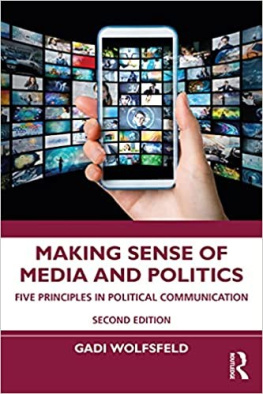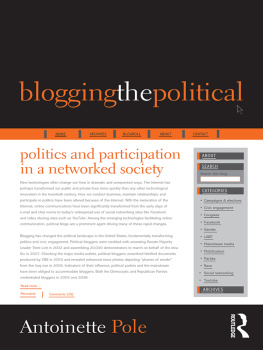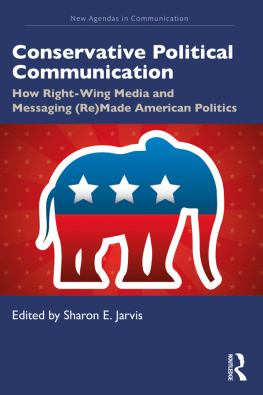
Praise for Making Sense of Media and Politics, Second Edition
In this second and significantly updated edition, Gadi Wolfsfeld shows how his five core principles regarding the roles of political elites, journalists, and the public continue to apply in the digital era. Theoretically sophisticated, empirically grounded, and accessibly written, Making Sense of Media and Politics is an excellent choice for a central text in introductory political communication courses or as a supplement to more general courses in politics, journalism, and media studies.
Michael Delli Carpini, University of Pennsylvania, USA
As a political communications scholar, researcher and educator, I highly recommend Gadis book. I have used it consistently in my political communication class and undergraduate students absolutely love it, referring to it as fun, engaging, and not as your typical textbook. In fact, they always praise it in their final evaluations and expectedly complain about the shift from the textbook to academic articles. The book is written in an engaging and accessible language, often sarcastic, has fun and timely examples, and concludes each chapter with useful discussion questions. I look forward to using the book again.
Magdalena E. Wojcieszak, University of California, Davis, USA
No other book makes better sense of the love-hate, multi-layered power-game between traditional media, social media, and politics. Gadi Wolfsfeld, a great academic storyteller, masterfully molds complex academic research into five core stories. I have used the first edition of this book in my Intro to Political Communication course, and it was the text my students liked most. Naturally, this second edition is a must-read for my future students.
Tamir Sheafer, The Hebrew University of Jerusalem, Israel
Wolfsfeld has taken the theoretically innovative, eminently readable, and unexpectedly humorous distillation of political communication insights from the first edition and updated it for the social media age. Ive been using the first edition in my undergraduate courses for years and highly recommend this thoroughly revised second edition. Its the best and punchiest conceptual synthesis of the political communication literature that I know.
Scott Althaus, University of Illinois at Urbana-Champaign, USA
This textbook is probably the best way to help comprehend the many politics-media interactions and their effects. After reading this book one feels better equipped to understand political actors, the competition between them, how they are covered in the news and discussed online, and why this matters for the world we live in.
Peter Van Aelst, University of Antwerp, Belgium
Making Sense of Media and Politics
In Making Sense of Media and Politics, Gadi Wolfsfeld introduces readers to the most important concepts for examining the interrelationship of media and politics. Five major principles are used to summarize the major arguments:
- Political power can usually be translated into power over all forms of media.
- When the powerful lose control over the political environment, they also lose control over all forms of media.
- Every political story that appears in every form of media is biased.
- All forms of media are primarily dedicated to telling good stories, which can have a major impact on political processes.
- Many of the most important effects of the various forms of media on citizens tend to be unintentional and unnoticed.
By identifying these five key principles of political communication, Wolfsfeld examines those who package and send political messages, those who transform political messages into stories, and the effects this can have on citizens, and how the more active members of the public (users) can initiate their own stories. The result is a brief, engaging guide to help make sense of the wider world of media and politics and an essential companion to more in-depth studies of the field.
New to the Second Edition
- Up-to-date coverage of major political events in the last decade, including the landmark US elections of 2016 and 2020.
- Devotes more attention to the hybrid media system that has developed over the last decade, providing a greater balance between traditional news and social media in particular.
- Includes more cross-national research, especially in non-Western and non-democratic countries.
- Refines the five principles of political communication to better reflect contemporary media trends.
- Covers key emerging topics including misinformation and threats to democratic institutions, new forms of political engagement, and the economic base of the various forms of media.
Gadi Wolfsfeld is Professor of Communication and Head of the Communications and New Media MA program at the Sammy Offer School of Communication at Reichman University (formerly IDC), Herzliya, Israel.
Making Sense of Media and Politics
Five Principles in Political Communication
Second Edition
Gadi Wolfsfeld

Cover image: Shutterstock
Second edition published 2022
by Routledge
605 Third Avenue, New York, NY 10158
and by Routledge
4 Park Square, Milton Park, Abingdon, Oxon, OX14 4RN
Routledge is an imprint of the Taylor & Francis Group, an informa business
2022 Taylor & Francis
The right of Gadi Wolfsfeld to be identified as author of this work has been asserted in accordance with sections 77 and 78 of the Copyright, Designs and Patents Act 1988.
All rights reserved. No part of this book may be reprinted or reproduced or utilised in any form or by any electronic, mechanical, or other means, now known or hereafter invented, including photocopying and recording, or in any information storage or retrieval system, without permission in writing from the publishers.
Trademark notice: Product or corporate names may be trademarks or registered trademarks, and are used only for identification and explanation without intent to infringe.
First edition published by Routledge 2011
Library of Congress Cataloging-in-Publication Data
Names: Wolfsfeld, Gadi, author.
Title: Making sense of media and politics : five principles in political communication / Gadi Wolfsfeld.
Description: Second edition. | New York, NY : Routledge, 2022. | Includes bibliographical references and index. | Identifiers: LCCN 2021045952 (print) | LCCN 2021045953 (ebook) | ISBN 9781032009933 (hardback) | ISBN 9781032009834 (paperback) | ISBN 9781003176657 (ebook)
Subjects: LCSH: Communication in politics. | Mass media--Political aspects. | Press and politics.
Classification: LCC JA85 .W65 2022 (print) | LCC JA85 (ebook) | DDC 320.01/4--dc23/eng/20211206
LC record available at https://lccn.loc.gov/2021045952
LC ebook record available at https://lccn.loc.gov/2021045953
ISBN: 978-1-032-00993-3 (hbk)
ISBN: 978-1-032-00983-4 (pbk)
ISBN: 978-1-003-17665-7 (ebk)
DOI: 10.4324/9781003176657
Typeset in Garamond
by Deanta Global Publishing Services, Chennai, India
This book is dedicated to Lauren, Noa, Dana, Eli, Shay, and my four adorable grandchildren: Shakked, Matan, Adva, and Ram. They are, and will always be, the most important reasons for everything.
Contents
PART I
Political Actors Compete of the Media
PART II
Turning Politics into Stories
PART III
Media Effects and Users Interactions
Next page









